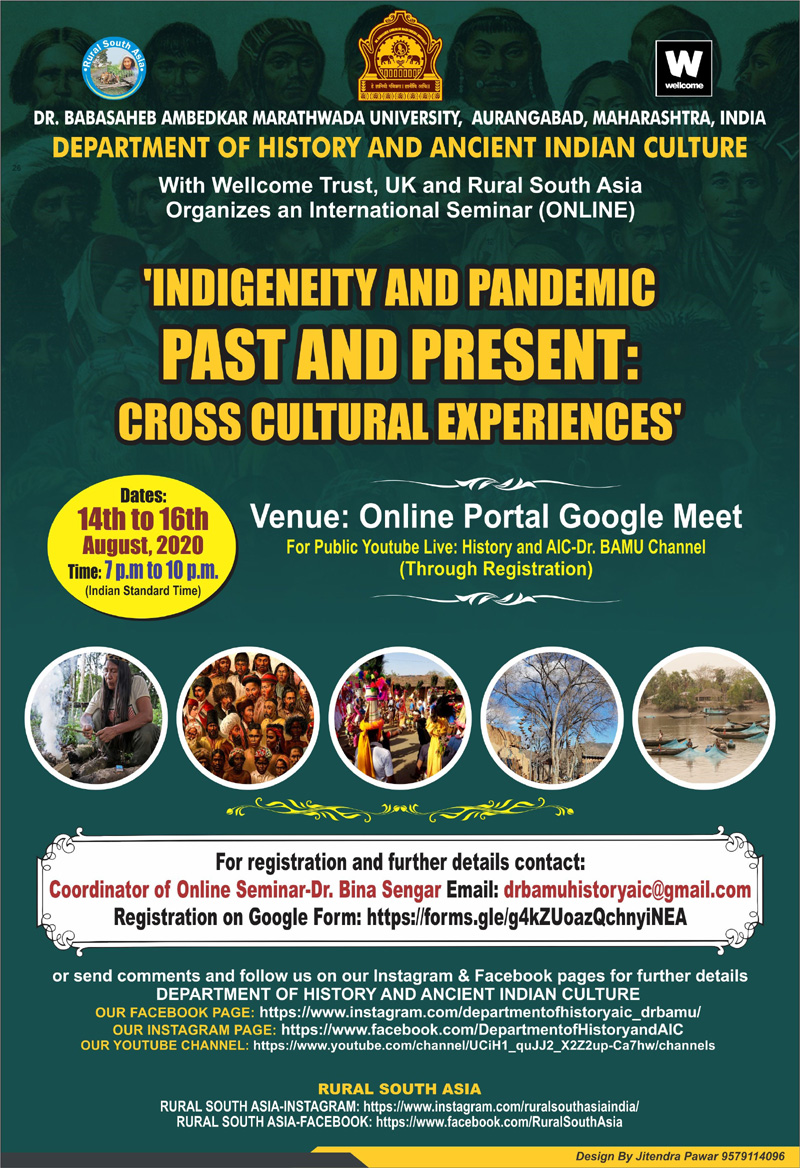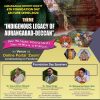
Indigeneity and pandemic past and present: cross cultural experiences
Dr. Babasaheb Ambedkar Marathwada University, Aurangabad Maharashtra, India
Department of History and Ancient Indian Culture
with
Wellcome Trust, UK and Rural South Asia organizes An international Seminar (ONLINE)
‘Indigeneity and pandemic past and present: cross cultural experiences’
Dates: 14th to 16th August, 2020
Time: 7p.m. to 10 p.m. (Indian Standard Time)
Venue: Online Portal GOOGLE MEET
For Public Youtube Live: History and AIC-Dr. BAMU Channel (Through Registration)
YOUTUBE LINK: https://www.youtube.com/channel/UCiH1_quJJ2_X2Z2up-Ca7hw/about?view_as=public
The perplexing year of THE 2020, is the exclusive year when whole world is dazed and terrified with the ongoing and upcoming developments of continuous natural and human induced disasters. The major anthropogenic-environmental calamity and challenge to human societies this year remains the SARS-Covid-II pandemic commonly known as Corona or COVID-19. The epidemic which perhaps began from China took shape of a pandemic somewhere around January 2020 and by March, 2020 it brought entire world on a notorious standstill. Whenever this pandemic may end, it will be inscribed as one of the major historical episodes in history of humankind. At present entire world is reacting and adjusting with the state induced methods to combat COVID-19 pandemic. The instances to control pandemic are leading some societies to submissively follow the norms irrespective of increasing financial inequalities, whereas some communities and nations are adversely reacting. The present dynamics inherent in the community behaviour patterns to react pro and against the epidemiological norms (of WHO) are unraveling the global colonial-capitalist legacies. The community reactions world-wide bring us into postcolonial era debates of decolonization and postnationalism against the centralized bureaucracy which forcibly homogenized or sectionalized communities against its inclusive tribalism (Acton:1861, Breen et. al: 2010). In shrouding pandemic, decolonization through the voices of indigenous centric geopolitics are asserting themselves further. The indigenous assertation becomes even more applicable as we see how some of the decolonized indigenous nations have proven their success in dealing with COVID-19 (for e.g. Taiwan and New Zealand). On the contrary in some regions of world pandemic is reliving its colonial memory and cultural orthodoxy. The polemics of epidemiology and determinants of colonization, regressive and progressive indigeneity propose need for restudying epidemics through historical narratives.For our present state and community reflexes to pandemics are inherent in colonial narratives and indigenous responses to diseases and epidemics in historical timelines.
Thus, through this online seminar we propose a global cultural discourse on indigeneity and pandemics.
We welcome all the dignitaries, panelists, and participants, come join us to know pandemics through indigenous perspectives
For registration and further details contact: Coordinator of Online Seminar-Dr. Bina Sengar
Email: drbamuhistoryaic@gmail.com
Registration on Google Form: https://forms.gle/g4kZUoazQchnyiNEA
or send comments and follow us on our Instagram & Facebook pages for further details
DEPARTMENT OF HISTORY AND ANCIENT INDIAN CULTURE
OUR FACEBOOK PAGE:https://www.instagram.com/departmentofhistoryaic_drbamu/
OUR INSTAGRAM PAGE:https://www.facebook.com/DepartmentofHistoryandAIC
OUR YOUTUBE CHANNEL:https://www.youtube.com/channel/UCiH1_quJJ2_X2Z2up-Ca7hw/channels
RURAL SOUTH ASIA
RURAL SOUTH ASIA-INSTAGRAM: https://www.instagram.com/ruralsouthasiaindia/
RURAL SOUTH ASIA-FACEBOOK: https://www.facebook.com/RuralSouthAsia


Leave a Comment